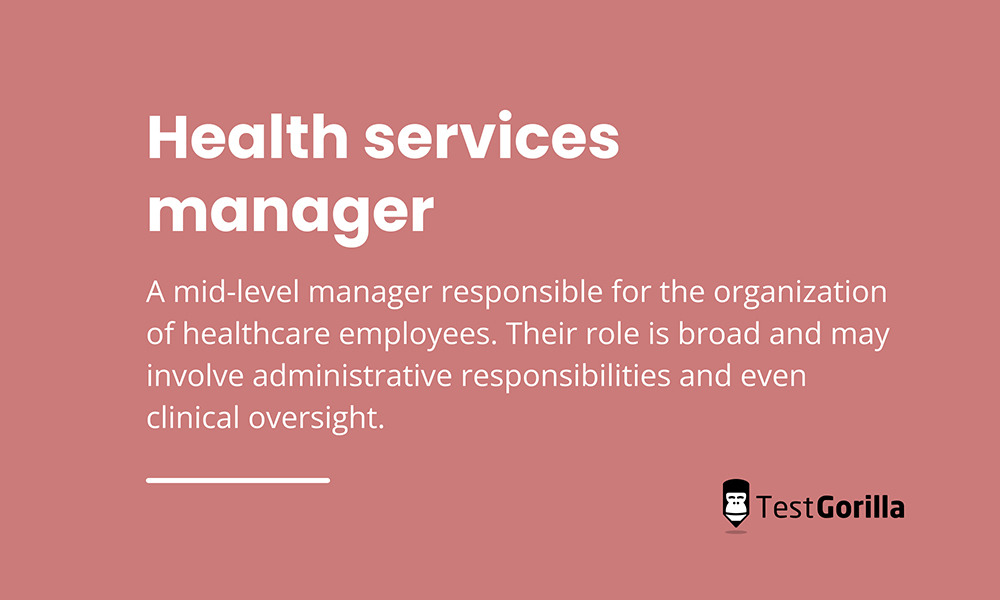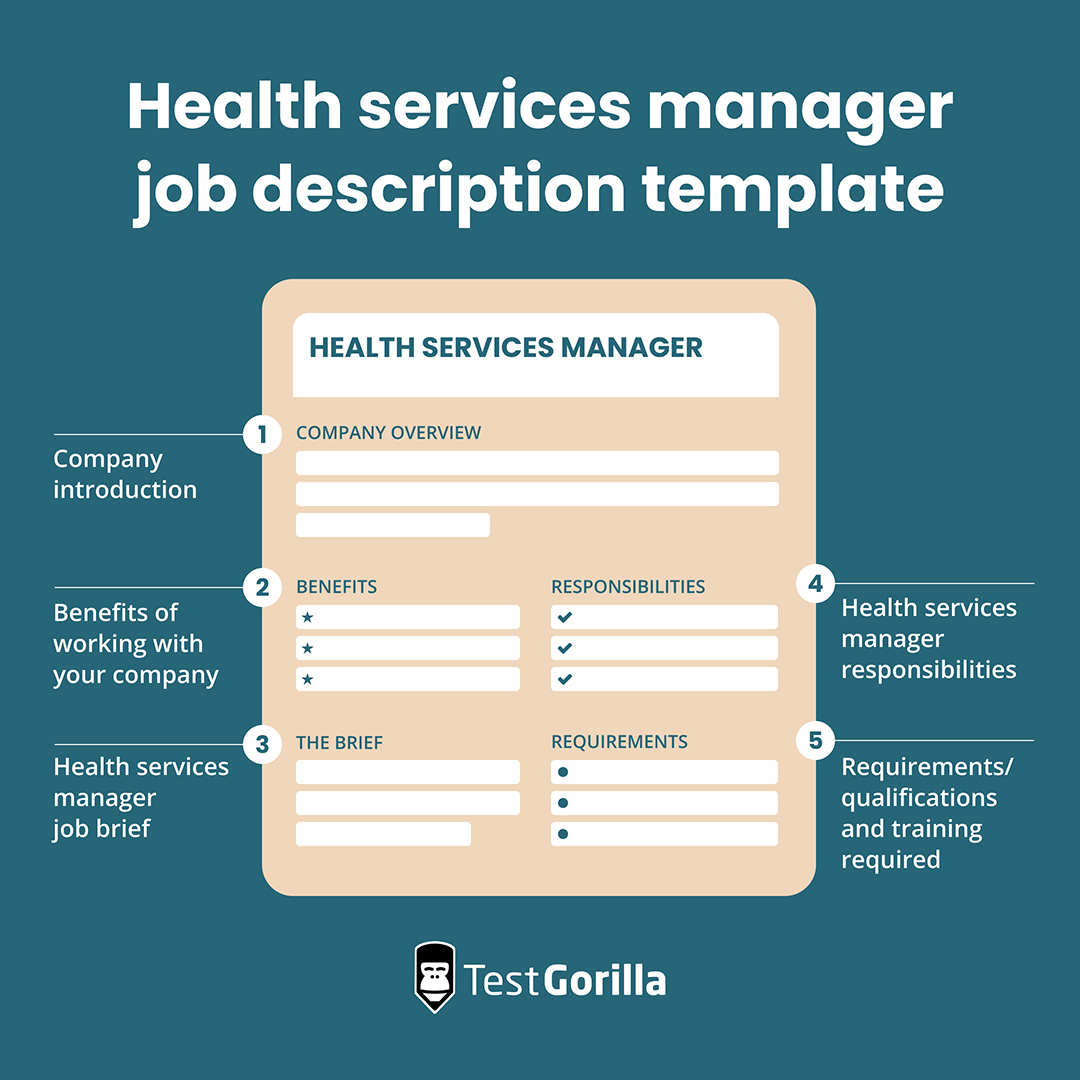Health services managers ensure the smooth running of your healthcare business, support your healthcare employees, and ensure patient safety. So, finding strong candidates for these positions is a must.
However, writing a health services manager job description – one that attracts the right candidates – is tough. You must balance soft skills with technical knowledge, legal expertise, and the right qualifications.
Without this balance, you might attract a mis-hire that disrupts the flow of your business, causes miscommunications, or – in the worst case – contributes to unsafe working practices.
The first step to preventing a mis-hire is writing a great job description. That’s why we’ve created this guide. We cover which skills to look for in health services managers and what you shouldn’t include in your job description. We even include a handy template.
Table of contents
- What is a health services manager?
- Key skills to look for in health services managers
- How to write an effective health services manager job description
- Health services manager job description template
- 3 things to avoid when writing a job description for health services managers
- Next steps: Attracting and assessing health services manager candidates
- FAQs
- Find your next health services manager with TestGorilla
What is a health services manager?
A health services manager is usually a mid-level manager responsible for the organization of healthcare employees. Their role is broad and may involve administrative responsibilities and even clinical oversight. For example, they might specialize in managing a particular business area like reporting and analytics, finance, or human resources. But they could also be team leaders of healthcare professionals, including nurses, doctors, pharmacists, or opticians.
Key skills to look for in health services managers
Healthcare services managers need a good balance of hard and soft skills to succeed in their role, including:
Ethical and legal awareness for navigating healthcare laws, regulations, legislative updates, and ethical considerations
Problem solving skills for coming up with creative solutions to day-to-day problems, like flu outbreaks
Strong interpersonal skills for building positive relationships with teams, healthcare professionals, and patients
Organizational skills for maintaining the efficient, safe, and legal operation of healthcare facilities
The best insights on HR and recruitment, delivered to your inbox.
Biweekly updates. No spam. Unsubscribe any time.
How to write an effective health services manager job description
Writing a clear health services manager job description will help you attract your perfect next hire. Try including the following points:
The health information systems (HISs) you use
HISs allow health service managers to oversee data security, optimize patient care, and ensure operational efficiency. These systems typically encompass electronic health records (EHRs), computerized physician order entry (CPOE) systems, and health information exchange (HIE) platforms.
Prior experience with the specific HISs your department uses enables your candidate to hit the ground running when they start the job. So, list the HISs you use to attract experienced or willing-to-learn candidates.
Accreditation and certifications required
Listing the certifications and accreditations needed to work with your organization will ensure only qualified candidates apply. For example, do your candidates need the Certified Healthcare Executive (CHE) or the Certified Professional in Healthcare Management (CPHM)? If so, be sure to specify these requirements upfront.
This transparency helps set clear expectations, saving both your organization and potential candidates time.
Knowledge of healthcare laws and regulations
Health services managers need an in-depth understanding of the latest healthcare laws and regulations. Without this knowledge, managers could be vulnerable to compliance issues that can have serious consequences for the organization.
Since healthcare regulations evolve, candidates need to update their knowledge continually and adapt their practices to ensure compliance. In your job description, highlight the need to stay updated with important laws to draw in adaptable candidates. This will also ensure your health services manager job description meets current industry standards.
Health services manager job description template
Here’s a template for a skills-based hiring approach. Use it to find your next health services manager after modifying it to meet your company’s needs.
Company introduction
This section should include a brief overview of your company’s history, mission statement, culture, vision, and values. This is your chance to make a great first impression on your candidates, so be sure to sell the highlights of your business.
Include the benefits of working for your business, too – like retirement plans, paid time off (PTO), or free snacks.
Health services manager job brief
[Company name]
Job title: [For example, Health Services Supervisor, Pharmacy Team Lead, or Ward Manager]
Reports to: [For instance, Senior Health Services Manager or Hospital Director]
Job type: [Full-time, part-time, on-site, remote, or hybrid]
[Compensation details]
Health services manager responsibilities
This will vary based on your specific industries’ requirements. However, you should generally include:
Management tasks like approving PTO, managing absences, and training employees
Crisis management: navigating high-pressure situations and handling and defusing crises
Patient advocacy: advocating for patient rights, actively addressing patient concerns, and fostering a patient-centered approach to care
Ethical decision-making concerning patient care, staff conflicts, and the application of policies
Requirements/qualifications and training required
Bachelor’s/Master’s degree in healthcare management or related field
[3+] years’ experience in a healthcare environment
Previous management experience
3 things to avoid when writing a job description for health services managers
Watch out for these common pitfalls when writing a health services manager job description.
1. Using too much jargon
Avoid using overly technical language or medical jargon. Although health services managers should have a solid understanding of medical terminology, overloading your job description with these terms might confuse applicants or deter them from applying.
For example, a qualified candidate from a dermatology background might refrain from applying for a role in audiology if too much technical language is used. Instead, try using neutral language and easy-to-understand phrases. For example, instead of saying “Responsible for managing HAD colleagues,” try “Responsible for managing hearing-aid-dispensing colleagues.”
2. Underplaying the technical aspect of the role
Healthcare industries are dependent on technology. So, you should be upfront and honest about the technical requirements of the role. Clearly list the technology and software the candidate will use on a daily basis, and include the required proficiency level.
Without this specification, you might appeal to unsuitable candidates or hire candidates who become overwhelmed by the technical requirements of the role. This could lead to stress, poor performance, or worse.
3. Not emphasizing soft skills
Soft skills are just as crucial for health service managers as their technical abilities. Good managers need robust communication skills, problem-solving, crisis management, adaptability, and more. So, clearly list the soft skills you’re looking for in your health services manager job description.
Without this level of clarity, candidates might underestimate the soft skills needed for the role. This means more unsuitable candidates will apply. If they’re hired, the misalignment of expectations might result in their dissatisfaction with the role and your company’s dissatisfaction with them.
Next steps: Attracting and assessing health services manager candidates
Once you’ve written a great health services manager job description, put it out into the world. Register your job description on popular job boards like LinkedIn or specialist healthcare job boards like Nurse.com or AbsoluteHealthcare.
Once you have a pool of applicants, you should screen them to find the best ones. You can do this with online pre-employment tests like those offered by TestGorilla.
TestGorilla helps you measure candidates’ skills, competencies, and capabilities beyond what’s listed on their resume. With a library of 300+ scientifically-validated tests, TestGorilla will help you find the strongest healthcare professionals.
You’ll find the most success by combining multiple tests. This will show you how well candidates can handle the role’s responsibilities and whether their values and behaviors align with your organization.
FAQs
Which qualifications should I include in my job description?
This depends on the specific needs of your organization, the complexity of the role, and the sector of the healthcare industry you operate within. Do research on each certification to understand what the certification process involves and whether it aligns with your company’s needs. Consulting with industry-specific organizations and associations, including those that provide the certifications, is one way to do this.
How should I determine the salary to offer in my job description?
This will vary depending on the healthcare specialism and levels of experience. The salary you offer will indicate to candidates how highly you regard the role and can significantly impact the quality of candidates you attract. Research industry reports, competitors’ job ads, and job sites like Glassdoor that contain self-reported salaries to see what others are offering for similar roles.
Find your next health services manager with TestGorilla
Health services managers need a range of hard and soft skills to do their job well. To find the perfect new hire, you’ll need a combination of a strong job description and robust pre-employment testing.
This is where TestGorilla comes in. Our library of scientifically validated tests can help you ensure you’re assessing candidates thoroughly and fairly.
Sign up for your free plan today and find your perfect health services manager.
You've scrolled this far
Why not try TestGorilla for free, and see what happens when you put skills first.
















